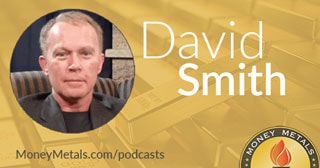3:26 PM Federal Reserve Cries Uncle as Rates Fall, Commodities Strengthen | |
Well now, without further delay, let’s get right to this week’s exclusive interview.
Mike Gleason: It is my privilege now to welcome back David Smith, Senior Analyst at The Morgan Report and regular contributor to MoneyMetals.com. David, it's been too long. How are you my friend? David Smith: It's been a while and I'm happy to be back, Mike. Mike Gleason: Well, David, for metals investors who got started after the 2008 financial crisis, it has not been an easy ride, as we both know. Prices rose sharply between 2008 and 2011, driven by the crisis and the Fed's response to it, 0% interest rates and massive amounts of money creation. Then the metals markets began to flounder. Some of the safe haven demand for metals dried up as the equity markets recovered and fear dissipated. Price rigging and suppression in the futures markets has progressed from conspiracy theory to conspiracy fact. Metals prices are not being set in free or fair markets, so it is not easy for some investors to hang in there. But the reasons to own metal are still there, bigger than ever. So, now might be a good time to review some of them. You talk a lot about precious metals role as insurance. Would you mind going over how metals act as a form of insurance for our listeners, David, as we start out today? David Smith: Well, there's several iterations of the insurance piece. As David Morgan of The Morgan Report always talks about, you buy the physical first and you buy that for insurance first and profits second. But if you look back, and a lot of people would not even believe this until they saw the chart. But gold held since 2000, has doubled the appreciation of the stock market, the overall stock market. So, in spite of the big plans that we've seen, that we saw from $1,900 down to about $1,050 and then the move in 2016, we had, which gave most of it back and gold ended up for the whole process from that point, down about 45%. Silver down about 70% from 2011. In spite of that, the metals are still using their role as insurance of helping you diversify, of helping contradict other price changes in investments you may have and then, providing liquidity for you. So they, historically, have done that very well, that role of insurance and they continue to do so. Mike Gleason: You talk about metals as a source of liquidity. What do you mean by that? David Smith: It means that if you need money, if you have some kind of an expense you need to deal with right away, you can sell the gold right now at any gold operation, any salesmanship. Whether it's a jewelry store or an operation like Money Metals and you can get your money for that to pay that expense. You can't do that with property. You can't do it with real estate, in general and collectibles and things like that. So, it gives you a real good opportunity. I always like to tell people from time to time, when you buy gold and silver, you don't think of it as buying something like a car or a fishing rod or a camera or something like this. You're exchanging one form, of which I would argue is inferior money, fiat money that's not backed by anything… you're exchanging that for a form of historic sound, honest money. You're not making a purchase per se. You're making an acquisition of a greater ability to have a financial element that can do really well for you and offer diversity.
Check out the full podcast/article here: https://goo.gl/p7Srnw | |
|
| |
| Total comments: 0 | |
